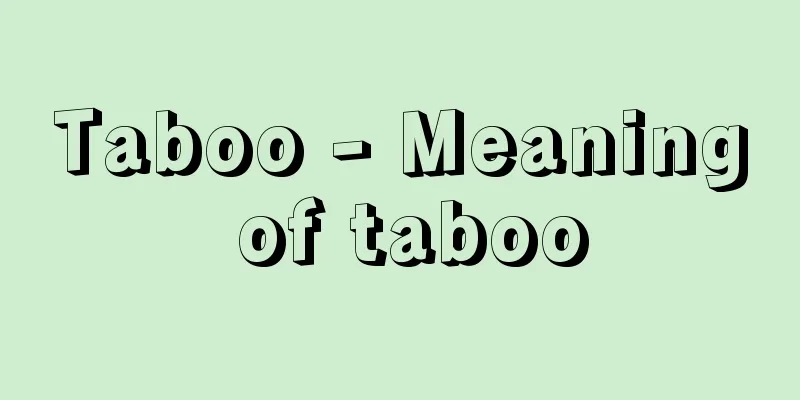Taboo - Meaning of taboo

〘Noun〙① A person involved in a Shinto ritual or Buddhist ceremony abstains from alcohol, meat, the five spicy foods, and other carnal desires for a certain period of time, and removes the impurities of body and mind by taking a bath, etc. Purification. Fasting. ※Shoki (720), July, 7th year of the Yūryaku era (Maeda Honin ) "The Emperor will not fast."② When having bad dreams or being possessed by a spirit, etc., the onmyōji judges that one should confine oneself to a house or a specific building for a certain period of time. Also, when fortune-telling or the calendar predicts bad luck, or when a person has been contaminated by something , it refers to secluding oneself and abstaining from evil. ※Utsubo (c. 970-999) Tada said, "He heard that 'he had a dream in which he should have been prayed to,' but 'he was called from the Imperial Palace,' and hurried out." ③ ② A sign of the time, written with 'monokimi' (monokimi) on a willow tree tag or a piece of grass, and hung on a crown or blind. Monokimi tag. ※Tonbo (c. 974) Part 2: "These monokimi appear to be pressed up against a pillar, and it seems that they are also in a bad state this year." ④ Boys and girls who participated in the Shinto rituals at Ise Grand Shrine and other major shrines, including Kashima, Katori, Kamo, Hirano, Matsuo, Kasuga, and Hiraoka. At Ise Grand Shrine, the girls are also called Kora . ※Shoku Nihongi - Tenpyo Shoho 5th year (753) January Dingwei "Five men and sixteen women. Each was given a different rank." ⑤ To grasp a certain phenomenon and predict good or bad luck, or to avoid bad words and replace them with good words. To be obsessed with superstition. ※Hogen (around 1220) Part 1 "As a military commander, I was given things like dreams and taboos."Mono-imai ...imahi [monobimo]Buk-ki [taboo]Source: The Selected Edition of the Japanese Language Dictionary About the Selected Edition of the Japanese Language Dictionary Information |
〘名〙① 神事や法会などに関係する者が、ある期間、酒肉、五辛などの飲食物や肉欲などを断ち、沐浴するなどして身心の穢(けが)れを除き去ること。潔斎。斎戒。※書紀(720)雄略七年七月(前田本訓)「天皇斎戒(モノイミ)したまはず」② 夢見のわるい時や物の怪(け)につかれた時など、陰陽師の判断によって一定の期間、家または特定の建物にこもって謹慎すること。また、その他広く占いや暦が凶である時や、触穢(しょくえ)にある者などが籠居して身を慎むこと。※宇津保(970‐999頃)忠こそ「『物いみし給ふべき夢を見つ』と聞え給へど、『内裏より召あり』とて急ぎ出で給ぬ」③ ②の時のしるしとして、柳の木の札、または忍草などに「物忌」と書いて冠、簾などにかけたもの。物忌の札。※蜻蛉(974頃)下「このものいみどもは、柱におしつけてなどみゆるこそ、ことしもをしからん身のやうなりけれ」④ 伊勢大神宮をはじめ、鹿島、香取、加茂、平野、松尾、春日、枚岡などの大社におかれて、神事にあずかった童男・童女。伊勢大神宮では、童女は子良(こら)とも称する。※続日本紀‐天平勝宝五年(753)正月丁未「物忌男五人。女十六人。授レ位各有レ差」⑤ ある現象をとらえて吉凶を占ったり、不吉なことばを忌んで、吉祥のことばに転嫁したりすること。縁起にとらわれること。※保元(1220頃か)上「武将の身として、夢見・物忌など余におめたり」
もの‐いまい ‥いまひ【物忌】ぶっ‐き【物忌】出典 精選版 日本国語大辞典精選版 日本国語大辞典について 情報 |
Recommend
Gould, J.
...In the 20th century, new subjects were added, ...
Tonality - English
A term in music theory. A system that focuses on ...
African civet (English name) Civettictis civetta; African civet
Carnivora, Viverridae. Body length 67-80cm. It has...
Edo Michitaka
...A medieval samurai family active in Musashi an...
Andreas Franz Wilhelm Schimper
German botanical geographer. Born in Strasbourg. ...
fermentation lactic acid
...Even when heated for a long time at normal pre...
Bauhinia purpurea (English spelling)
…[Kazuo Furusato]. … *Some of the terminology tha...
Hynobiidae
…A general term for amphibians in the order Hynob...
dorsal side
…In both fish and tetrapods, the muscular region ...
Kame - Fish
〘Noun〙 (In ancient times, it was made from woven c...
Coleus; flame nettle; painted leaves
A general term for the genus Coleus in the family ...
Kula Kangri (mountain)
The highest peak in the Bhutan Himalayas, which oc...
Aleksandr Evgen'evich Fersman
Russian mineralogist and geochemist. Born in St. ...
Primož Trubar
1508‐86 A Yugoslav humanists. Slovenian. He studie...
Osuga Otsuji - Osuga Otsuji
Haiku poet. Born in Nakamura-cho, Fukushima Prefe...





![Brown Leghorn [species] - Brown Leghorn](/upload/images/67d00eb83b9ab.webp)



